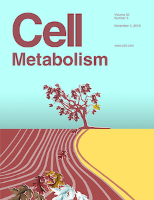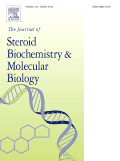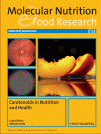
International Journal of Tryptophan Research
Scope & Guideline
Championing open access to tryptophan advancements.
Introduction
Aims and Scopes
- Tryptophan Metabolism and Its Pathways:
Research on the biochemical pathways involving tryptophan, particularly the kynurenine pathway, and their implications in various physiological and pathological conditions. - Influence of Tryptophan on Mental Health:
Exploration of the relationships between tryptophan metabolites and mental health conditions, including depression, anxiety, and cognitive functions. - Nutritional and Dietary Interventions:
Studies examining the impact of dietary components and supplements on tryptophan metabolism and related health outcomes. - Role of Tryptophan in Inflammation and Immune Response:
Investigations into how tryptophan and its metabolites influence inflammatory processes and immune system activity. - Clinical Implications and Biomarkers:
Research aimed at identifying tryptophan metabolites as potential biomarkers for various diseases and their utility in clinical settings.
Trending and Emerging
- Kynurenine Pathway and Neurological Disorders:
Recent studies are focusing on the kynurenine pathway's role in neurological disorders, linking tryptophan metabolism with neuroinflammation and neurodegenerative diseases. - Tryptophan's Role in Gut-Brain Axis:
Emerging research is highlighting the connection between tryptophan metabolism, the gut microbiome, and mental health, indicating its importance in understanding the gut-brain axis. - Tryptophan and Inflammation in Chronic Diseases:
There is an increasing focus on how tryptophan metabolites influence inflammation and immune responses in chronic diseases, including COVID-19 and metabolic disorders. - Impact of Maternal Factors on Tryptophan Metabolism:
Studies are beginning to explore maternal influences on tryptophan metabolism during pregnancy and their potential long-term effects on offspring health. - Innovative Therapeutic Approaches Targeting Tryptophan Metabolism:
Research is trending towards developing novel therapeutic strategies that modulate tryptophan metabolism for the treatment of various diseases, including cancer and autoimmune conditions.
Declining or Waning
- Basic Mechanistic Studies in Non-Clinical Models:
There is a noticeable reduction in basic studies focusing solely on mechanistic insights in non-clinical models, as more emphasis is being placed on translational research and clinical implications. - Tryptophan's Role in Traditional Psychiatric Disorders:
Research specifically centered on tryptophan's role in classical psychiatric disorders like depression is becoming less frequent, possibly due to the expanding focus on broader metabolic and inflammatory contexts. - Explorations of Tryptophan in Non-Metabolic Diseases:
Interest in the role of tryptophan in diseases not primarily associated with metabolic or inflammatory pathways seems to be waning, as the journal pivots towards more relevant and impactful health issues.
Similar Journals

NUTRITION AND CANCER-AN INTERNATIONAL JOURNAL
Bridging the Gap Between Nutrition and Cancer CareNUTRITION AND CANCER - AN INTERNATIONAL JOURNAL, published by ROUTLEDGE JOURNALS, TAYLOR & FRANCIS LTD, stands as a vital resource in the interconnected realms of nutrition and oncology. Since its inception, this journal has been at the forefront of disseminating cutting-edge research and innovative findings related to the impact of nutrition on cancer prevention, treatment, and survivorship. With an impressive track record spanning from 1978 to 2024, this quarterly publication is categorized within the third and second quartiles across multiple fields, including Cancer Research and Nutrition and Dietetics, signifying its importance in these disciplines. Researchers and practitioners alike can benefit from its comprehensive studies, rigorous reviews, and insightful commentary, all aimed at fostering evidence-based practices for improving patient outcomes. Although not open access, the journal ensures wide dissemination of critical research findings, contributing to the global conversation on the role of dietary factors in cancer epidemiology. By exploring the latest advancements, NUTRITION AND CANCER invites a diverse audience of scholars, clinicians, and students to engage with the dynamic interplay between nutrition and cancer.

NUTRITION
Unraveling the complexities of nutrition and wellness.NUTRITION is a prestigious peer-reviewed journal published by Elsevier Science Inc, dedicated to advancing the field of dietary practices and metabolism. With an ISSN of 0899-9007 and an E-ISSN of 1873-1244, this journal has been serving the academic community since its inception in 1987, showcasing high-quality research and reviews through 2024. Recognized for its significant contributions to the fields of Endocrinology, Diabetes and Metabolism and Nutrition and Dietetics, NUTRITION holds a commendable Q2 category ranking in both areas, reflecting its impactful presence with a Scopus rank of #26 out of 140 and #51 out of 244 in its respective categories. The journal primarily aims to disseminate innovative research findings that illuminate the complex interplay between nutrition and health, fostering a deeper understanding among researchers, healthcare professionals, and students alike. By bridging scientific inquiry with practical application, NUTRITION plays a vital role in shaping public health policies and dietary recommendations worldwide.

JOURNAL OF EVOLUTIONARY BIOCHEMISTRY AND PHYSIOLOGY
Decoding the Evolutionary Threads of Biochemical ProcessesJOURNAL OF EVOLUTIONARY BIOCHEMISTRY AND PHYSIOLOGY, published by PLEIADES PUBLISHING INC, is a pivotal periodical that delves into the intricate relationships between biochemical processes and evolutionary dynamics. With its ISSN 0022-0930 and E-ISSN 1608-3202, this journal serves as a comprehensive platform for researchers, professionals, and students dedicated to understanding the physiological adaptations and biochemical mechanisms influenced by evolutionary pressures. Although it is not an open access journal, it offers valuable insights across its historically significant coverage spanning from 1972 to 2017, making it an essential resource for those working in agricultural, biological, and molecular sciences. Despite its current Scopus rankings revealing limited visibility within its fields, the journal remains committed to fostering scholarly dialogue and advancing knowledge in the realm of evolutionary biochemistry, especially for those exploring the ecological, genetic, and integrative physiological aspects of life.

Nutrition and Dietary Supplements
Transforming Nutritional Knowledge into PracticeNutrition and Dietary Supplements is a premier, peer-reviewed journal published by DOVE MEDICAL PRESS LTD, dedicated to the exploration of advances in nutritional science and the role of dietary supplements in health and disease management. Since its inception, the journal has maintained an Open Access model, enabling researchers, professionals, and students worldwide to access high-quality, cutting-edge research without barriers. With an emphasis on evidence-based findings, the journal encourages submissions that evaluate the efficacy, safety, and innovation within the field of nutrition, making a significant impact on public health and dietary guidelines. The journal's ISSN is 1179-1489 and its commitment to disseminating meaningful research positions it as a vital resource for those involved in nutrition science.

Molecular Metabolism
Catalyzing Knowledge in Cell and Molecular BiologyMolecular Metabolism is a premier, open-access journal published by Elsevier, dedicated to advancing the understanding of metabolic processes at the molecular level. With an ISSN of 2212-8778 and a proud presence in Germany, the journal has made significant contributions to the fields of Cell Biology and Molecular Biology, consistently achieving a Q1 ranking in both categories as of 2023. The journal’s scope encompasses cutting-edge research that explores metabolic pathways, their regulation, and implications for human health, underscoring the interplay between metabolism and various biological functions. Researchers and professionals benefit from the journal’s robust visibility, as it ranks #40 among 410 journals in Molecular Biology and #35 among 285 in Cell Biology according to Scopus metrics, placing it in the top 10 percentile in its field. With open access since 2012, Molecular Metabolism ensures that groundbreaking research is available to all, fostering a collaborative and inclusive academic environment. Its commitment to excellence and accessibility makes it an invaluable resource for those invested in metabolic research.

Cell Metabolism
Unraveling the complexities of metabolism.Cell Metabolism is an esteemed journal published by CELL PRESS, dedicated to advancing the understanding of metabolic processes within cell biology, molecular biology, and physiology. With an impactful 2023 ranking placing it at Q1 in multiple categories and earning a distinguished position in the top percentiles of its respective fields, this journal serves as an essential resource for researchers, professionals, and students who are investigating the dynamic roles of metabolism in health and disease. Its rigorous peer-review process ensures high-quality publications that reflect the latest advancements in metabolic research. Since its inception in 2005, Cell Metabolism has become a pivotal platform for disseminating critical findings that not only expand scientific knowledge but also foster innovative approaches to tackle metabolic disorders. By prioritizing accessibility and scholarly excellence without the Open Access model, it remains a premier source for cutting-edge research insights.

JOURNAL OF STEROID BIOCHEMISTRY AND MOLECULAR BIOLOGY
Exploring Molecular Mechanisms and Biochemical PathwaysJOURNAL OF STEROID BIOCHEMISTRY AND MOLECULAR BIOLOGY is a distinguished peer-reviewed journal published by Pergamon-Elsevier Science Ltd, committed to advancing the fields of biochemistry, molecular biology, and endocrinology. With an ISSN of 0960-0760 and an E-ISSN of 1879-1220, this journal has garnered a notable reputation, securing a Q2 ranking in numerous categories, including Biochemistry, Cell Biology, and Clinical Biochemistry, as of 2023. Hailing from the United Kingdom, it serves as a critical platform for the dissemination of impactful research from 1990 to 2025 and beyond. Although it does not currently offer open access options, the journal's comprehensive coverage and rigorous peer review process ensure high-quality publications that significantly contribute to the understanding of steroid biochemistry and related fields. Targeting a diverse audience of researchers, professionals, and students, the journal remains an essential resource for those seeking to stay at the forefront of scientific innovation and discovery.

MOLECULAR NUTRITION & FOOD RESEARCH
Advancing the Science of Nutrition and Food Innovation.MOLECULAR NUTRITION & FOOD RESEARCH, published by Wiley, is a premier journal dedicated to the rapidly evolving field of food science and nutrition. With an impressive impact factor and a consistent position in the Q1 category for both Biotechnology and Food Science in 2023, this journal stands out as a leading platform for researchers, professionals, and students alike. The scope encompasses a comprehensive range of topics from molecular nutrition to innovative food research, with a focus on translating scientific insights into practical applications that enhance human health. As part of its commitment to accessibility, the journal offers open access options, allowing for wider dissemination and engagement with the academic community. Given its high ranking in Scopus—placing 42nd in Food Science and 62nd in Biotechnology—the journal plays a critical role in advancing knowledge and fostering collaboration in these essential fields. For over two decades, it has provided a vital forum for cutting-edge research, ensuring that each issue contributes significantly to the discourse around food and nutrition.

MOLECULAR AND CELLULAR BIOCHEMISTRY
Unraveling the Mysteries of Molecular BiologyMOLECULAR AND CELLULAR BIOCHEMISTRY, an esteemed journal published by SPRINGER, serves as a prominent platform in the fields of biochemistry and molecular biology. With a history of dissemination since 1973, this journal has made significant contributions to the understanding of biochemical processes at the molecular level. The MOLECULAR AND CELLULAR BIOCHEMISTRY journal focuses on a myriad of topics including but not limited to cellular biochemistry, clinical biochemistry, and interdisciplinary approaches in medicine, boasting a commendable categorization in the 2023 Scopus ranks where it falls under Q3 in Cell Biology, Q2 in Clinical Biochemistry, Q1 in Medicine (miscellaneous), and Q2 in Molecular Biology. Although the journal is not open access, it provides access options through institutional subscriptions, making valuable research accessible to a wider audience. With its rigorous peer-review process and high impact within the scientific community, this journal aims to advance knowledge and stimulate exploration in biochemical research, making it essential reading for researchers, professionals, and students alike.

CELL BIOCHEMISTRY AND FUNCTION
Fostering Collaboration in Biochemistry and Cell BiologyCELL BIOCHEMISTRY AND FUNCTION is a prominent journal dedicated to disseminating high-quality research in the fields of biochemistry, cell biology, and clinical biochemistry. Published by Wiley, this journal has maintained an esteemed reputation since its inception in 1983, bridging decades of scientific advancements and contributions until 2024. With ISSN 0263-6484 and E-ISSN 1099-0844, it serves as a vital resource for researchers, professionals, and students. The journal is classified in quartiles Q2 and Q3 across various categories in the 2023 rankings, showcasing its impact and significance within the academic community. Highlighting essential studies in medicinal biochemistry and cellular functionalities, CELL BIOCHEMISTRY AND FUNCTION not only presents cutting-edge research but also encourages interdisciplinary collaboration, thereby advancing the understanding of biochemical processes that underlie living systems. With no open access currently available, readers are encouraged to access articles through institutional subscriptions or individual purchases, ensuring exclusive engagement with the latest scientific findings in this dynamic field.